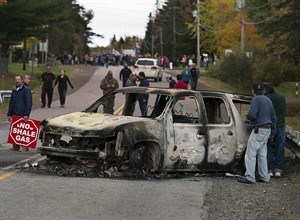
A burned police vehicle is seen in Rexton, N.B., as police began enforcing an injunction to end an ongoing demonstration against shale gas exploration in eastern New Brunswick on Thursday, Oct.17, 2013. An obscure conflict between the Mi'kmaq of eastern New Brunswick and a company searching for shale gas had dragged on for more than two years before it exploded as a national issue two months ago amid images of flaming Molotov cocktails and torched police cars. THE CANADIAN PRESS/Andrew Vaughan
December 19, 2013 - 8:11 AM
An obscure conflict between the Mi'kmaq of eastern New Brunswick and a company searching for shale gas had dragged on for more than two years before it exploded as a national issue two months ago amid images of flaming Molotov cocktails and torched police cars.
Until then, few Canadians had heard of the Elsipogtog First Nation or SWN Resources.
Like so many other disputes between aboriginals and companies hoping to exploit the land where they live, this quarrel failed to attract much attention until violence erupted Oct. 17. On that day, 40 protesters opposed to seismic testing were arrested before a backdrop of riot police and burning vehicles.
However, the high-profile clash near Rexton has obscured a broader debate over aboriginal rights and the historic grievances of the Elsipogtog First Nation, says Chelsea Vowel, a Metis writer and educator who specializes in indigenous law.
"There's a wider context of unsettled land claims and many court decisions ... which have set out a road map for consulting with First Nations, but that's being missed," she said in an interview from Montreal.
"All people are seeing is the immediate reactions."
At the centre of the debate are the Peace and Friendship Treaties, signed in 1760-61.
Under these historic agreements, the Mi’kmaq and the Maliseet within the Maritimes agreed to certain trade and political alliances with the Crown, but the Supreme Court of Canada confirmed in 1999 that they did not surrender any rights to lands or resources.
As a result, these First Nations maintain that they still hold aboriginal rights and title throughout their traditional territory.
"Unfortunately, this glaring issue did not seem to percolate into the wider Canadian consciousness," Vowel said in a recently published opinion piece.
Michael McClurg, a Toronto-based lawyer who practices in the area of aboriginal and treaty rights, said these facts are key to understanding why aboriginal protesters felt justified in setting up blockades to stop the seismic testing and prevent the hydraulic fracturing that could follow if significant deposits of shale gas are found.
"The rule of law in this case would arguably dictate that the protesters have every right to be on their traditional land and that in fact, others, including the Crown and resource extraction companies, are trespassers," McClurg wrote in a recent blog post.
"In cases like Elsipogtog, injunction orders and police enforcement cannot and should not exist in a vacuum, separated from the extremely complex historical, cultural and legal nuances of the situation."
Those on the other side of the debate say the protesters are not above the rule of law, and that's why they should have respected the court injunctions aimed at preventing blockades and confrontations.
In an interview, McClurg said it's a mistake to think the rule of law is an inflexible concept that applies equally to everyone.
"The Supreme Court of Canada has referred to the rule of law as highly textured," said McClurg, who stressed that he does not speak for the New Brunswick band. "There are many other elements, including aboriginal and treaty rights, and including legitimate title claims to land."
Even the federal government has recognized that successive court decisions have made it clear the Crown has a duty to consult aboriginal people when conflicts like this erupt over land that was never ceded to the Crown.
"A consistent theme throughout these decisions has been the need for governments and aboriginal people to resolve their issues ... through negotiation, rather than litigation," the federal Aboriginal Affairs Department says on its website.
Brian Gallant, the Liberal Opposition leader in New Brunswick, said the problem is that Progressive Conservative Premier David Alward hasn't properly consulted with the Mi'kmaq, preferring instead to let the energy company do the talking.
"The Supreme Court of Canada has made it very clear you can't transfer the duty to consult to anyone. ... It shows that the Alward government didn't fully understand its responsibility," Gallant said.
In early October, Alward and members of the Elsipogtog First Nation agreed to form a working group to help end the protests. But the RCMP riot squad broke up the blockade less than two weeks later, saying the talks were going nowhere.
The province's energy minister, Craig Leonard, could not be reached for comment. The chief of the Elsipogtog First Nation, Aaron Sock, and the band's lawyer, T.J. Burke, did not respond to requests for interviews, nor did SWN Resources.
Larry Chartrand, a law professor at the University of Ottawa, said while it's true the government has an obligation to consult, it is not required to do anything more.
"At the end of the day, if they can't agree, the government can still go ahead and do what it wants as long as they've consulted," he said.
As well, if the Mi'kmaq want to assert an actual claim to land and resources, that requires an onerous and expensive court test, Chartrand added.
"It doesn't give the Mi'maq much of a chance to actually succeed," he said. "So they have to resort to more direct action."
News from © The Canadian Press, 2013